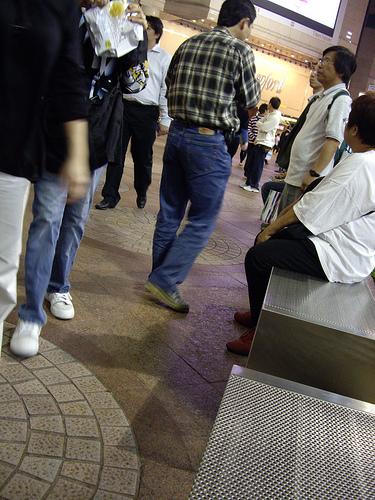
在之前的民間記者工作坊裏,已經向各位推薦過香港大學圖書館的HKUL Digital Initiatives網頁。香港大學是各間大專院校中,唯一將大部分畢業生論文放上網讓公眾參考的。很多民間記者有興趣的本地論題,都可以在Hong Kong University Theses Online找到相關的論文。
有關私人管理公共空間的論題,直接論及的就有三篇:
"A study of private/public space in Hong Kong" Too Wing-tak 杜永德 2007年
"A study on quasi-public space in large scale private residential development, case in Hong Kong" 余沛琨 2007年
"Towards more user-friendly public open spaces in high density areas" 羅嘉雯 2000年
可是很不巧,這三篇論文中,只有最後一篇是在網上能看到全文,第一篇只能看到目錄,第二篇則遲些才會放上網。
杜永德的博士論文紀錄了多個難得的訪問,包括時代廣場業主九龍倉的管理層、遮打大廈業主置地的管理層、有份參與發展新世紀廣場及中環中心的市建局高層,以及中環中心的物業經理,以了解他們對私人擁有公共空間的管理邏輯。這都是民間記者難以做到的訪問。之前英文《南華早報》記者已經引述了部分論文內容,但筆者認為,這些訪問的中文紀錄實在比翻譯要傳神得多,故分類抄錄如下。
第一部分:關於銅鑼灣時代廣場
訪問九龍倉中國有限公司Director & Chief Operating Officer K.C. Leung及Property Development (Architecture) 的Chief Manager Roger Y.P. Ma
訪問日期:二零零三年五月二十二日
I:訪問員杜永德;L:K.C. Leung;M:Roger Y.P. Ma
A﹞好驚堅拿道的老人家
I:Design facilities方面,有冇考慮過provide一啲枱櫈係俾啲人去用?
L:咩意思枱同櫈?
I:即係俾人坐下,或者有人gather喺度,stay耐啲,rather than......
L:依家咪有囉,但初初無,因為我哋有一個擔心,in fact,個度vicinity,你會發現堅拿道有好多老人家,或者有啲人成日坐喺度咁,無野做呀,即係依家都會有。即係我哋好驚呢,create咗個一個environment,攞晒果啲椅,變咗個個坐喺度,瞌眼瞓。即係你會做成,個個,成個氣氛......喂,呢個shopping mall唔係俾你啲老人家坐喺度。即係唔係話.....
M:Discriminate佢......
L:唔係discriminate佢,but in fact is 成個image,氣氛係唔妥囉。所以design嗰枱櫈係無,而且再加上我哋上面......果度闊度就唔係太過乜嘢啦。咁就覺得唔係太適宜。但係你依家睇倒呢,我哋慢慢就覺得有咁既need,咁我哋even open plaza依家裝咗一啲idea......我哋唔用bench,我哋用一啲架,適合於俾啲人喺度「笨」(lean on)。
「笨」得嚟,你坐得太耐又唔太舒服,但如果你真係「累」呢,你坐喺度,亦都可以收到一時既休息效果,你依家有冇發現一「炸」呢啲咁既嘢?It doesn't look like bench,但係.......蝦.......香港人呢.......我發現.......初初,我哋做咗一個mock up.......攞係度.......我睇吓有人識用…因為其實我個idea係喺日本見倒......咦......個design.......not exactly the same, but我覺得幾好喎,因為嗰度.......係Taitazuku,日本…有個shopping centre前面…的確有幾張呢啲咁既嘢,俾嗰啲後生仔,無嘢做,或者等人呢愛嚟「笨」既,我覺得幾好噃,呢個design好過…普通果啲,我細個.......欄河,戲院門口啲欄杆咁「笨」喺度,好難睇,但係呢個design,咁啱啱咁坐喺度呢,隻腳.......有得唞吓.......咁初初我哋做咗.......當時係世界杯.......一開始啲人唔知係乜嚟既,啲人以為.......唔知乜嚟.......但係佢又識「笨」「笨」得嚟好舒服,although,原來香港人好容易adapt囉,於是我哋依家extend咗十多個,咁其實都popular。
﹝引自論文第109頁註釋79﹞
B﹞成功阻止小販及派傳單
L:......因為我哋做果個control呢,plaza都做得幾成功啦,因為我哋初初好擔憂呢,呢度有小販,派單張,即係呢度係個open space,即係俾人一個感覺係,公眾哋方黎架嘛。咁我哋就話,一開始,day one,呢個defense line我哋要好清楚,咁執得好足,令到啲public知道呢個哋方係privately public。如果唔係呢,好vague架嘛,啲人照......喂public space吖嘛,咁so far我哋從day one做得好嚴格,所以話,無論係車方面,人......連派flyer都無。啲flyer係出面派,買牛肉乾果度。唔敢走入黎呢度派,因為我哋對於呢個defense 係好緊要,因為once呢一樣野唔defense,一鬆咗呢,好難架喇。
I:即係最初有咁既擔心?
L:day one,開始,我哋成個team有個共識就係,呢樣野一定要defense,因為呢一頭,賣小販,派flyer,乜都得。so far我哋呢度,都defense得好好。
I:即係有試過咁既case?
L:有!最初有,我哋派過好多人喺度,請人走。所以頭先個啲case,即係私家哋方但係都做咗咁多年啦,大家都知呢笪哋方係私人。
﹝引自論文第112頁註釋82﹞
C﹞絕謝政治活動
L:凡political既,因為我哋唔想乜乜政黨、競選、宣傳活動啦,我哋一律謝絕,因為我哋要neutralize,唔理你民主黨好,或者港進聯好,sorry,thank you very much,呢啲咁既野,我哋中立。例如佢去「洗樓」,我哋都係一視同仁,sorry,唔會因為我哋pro邊個黨,我最清楚係,凡係有political既、oriented既野,我哋盡量唔去做。
﹝引自論文第131-132頁註釋93﹞
第二部分:關於中環遮打大廈
訪問香港置地 Senior Development Manager of Commercial Property Clement K. M. Lau。香港置地名下的遮打大廈,過去逢周日都有菲律賓女傭在連接大廈的公共行人通道上聚會。遮打大廈年前裝修時,將原來露天的行人通道加上玻璃幕牆,使之成為室內的一部分,並禁止菲律賓人在玻璃幕牆範圍內聚集。Clement K. M. Lau﹝以下簡稱C﹞在訪問中提及對菲律賓女傭在置地物業周圍聚集的感想。
菲傭聚集影響香港旅遊業
C:我哋覺得呢個用法唔係咁好,即係你對於旅遊業黎講,尤其是我哋話promote香港做旅遊,咁我都曾經响mandarin飲茶,飲下午茶,咁我坐响窗門望,我一望出去,原來at the other side of the wall都有人坐左响度,一班人坐左响度傾計,咁我覺得好怪......
C:你坐呢度,咁佢度啦......有啲喺度啦......我都唔記得坐邊面......即係你......唔係咁囉,同埋你係as a guest,响個hotel行出黎,你會有咩感覺呢,掉番轉,你去到人哋既哋方,一出門口,一班人聚集喺度,你會有咩感覺......as一個visitor,你對呢達哋方有咩感覺......個image係......俾咗啲咩訊息人哋呢,咁呢個有必需去諗。
﹝引自論文第110頁註釋80﹞
第三部分:關於中環中心及新世紀廣場
訪問市建局﹝前土地發展公司﹞ Senior Assistant Executive Queen Pong及中環中心物業經理﹝property manager﹞Mr. Kwan,此部分並無中文訪問紀錄。
"in the case of the grand millennium Plaza and the Center, I interviewed with the Senior Assistant Executive, Ms Queen Pong of the Urban Renewal Authority (the former Land Development Corporation) about the provision of certain seating benches or tables for the public to enjoy the dedicated public space. She replied that the dedicated public space was supposed to be used for the office workers to have a short stay or a lunch break. She though(t) that the dedicated public space was an urban space which should be more formal and less leisurely than government garden or sitting-out area or residential garden. It was targeted for the working population there, so long period of stay was not encouraged and thus no armed or backed benches were provided. If someone treated this as a residential garden, they might wear sandals, read newspapers, lie or sleep in the area, which would make a bad image of the space."
﹝論文第109頁﹞
"From the property management point of view, democratic activities such as protest or demonstrations are 'nuisance' to the users of the private/public space. In an interview with the property manager of the Center, Mr Kwan, he explained to me why they exerted stricter control on the public users of the dedicated public space because the space was right at the foot of the office tower, and he had to manage the space for the sake of their tenants and office workers. Therefore, he viewed political activities such as public gathering, silent-sitting protest and demonstration within the dedicated area as disturbances to their tenants. Such activities were prohibited within the dedicated public spaces for the sake of the users of the tower. When the Urban Renewal Authority (URA) was still located in the Center, there were occasional protests held by residents affected by urban renewal projects. The property manager of the Center said that the protests created noise or blocked the passage. These actions annoyed the tenants. So he 'invited' them to move away from the dedicated area. And usually the protestors were understandable enough to stay away from the dedicated area to avoid blocking the passage. In my interview with the Senior Assistant Executive, Ms Queen Pong of the Urban Renewal Authority, she said that the protestors 'chased' them after the URA moved to the Grand Millennium Plaza. The property manager of the Grand Millenium Plaza also advised the protestors to get away from the dedicated areas to avoid disturbances to the outdoor restaurant and the office workers."
﹝論文第132頁﹞
從以上的訪問可見,對於私人管理者,最擔心的是影響形象,而最影響形象的是「無野做的老人家」和菲律賓女傭。他們甚至比要表達政治異議的人更加令人擔憂。可見,爭取私人管理公共空間擴大開放性,歸根究底就是要抗衡愈來愈張揚的年齡、階層和種族歧視。
注意:紅字及粗體標題、以及訪問內容的藍字highlight都是筆者所加。
圖:迪,時代廣場近月新設置的長櫈。



